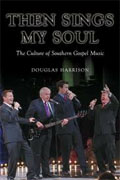Then Sings My Soul
Douglas Harrison
book reviews:
· general fiction
· chick lit/romance
· sci-fi/fantasy
· graphic novels
· nonfiction
· audio books
· author interviews
· children's books @
curledupkids.com
· DVD reviews @
curledupdvd.com
newsletter
win books
buy online
links
home
for authors
& publishers
for reviewers

 |
Then Sings My Soul: The Culture of Southern Gospel Music (Music in American Life) Douglas Harrison University of Illinois Press Paperback 256 pages April 2012 |
|
Raised in the Southern gospel culture, Douglas Harrison, an associate professor of English at Florida Gulf Coast University, begins his treatise on that culture with the assertion that the lyrics of Southern gospel songs are “incurious,” “juvenile,” “obvious,” and “predictable.” Since this is the opening to the first chapter, it tells us that underneath the erudite language and long sentences, Harrison’s approach to his subject matter will, at best, praise with faint damns. As well, his initial assertion is ironic if one considers that the title of his book taken from the mighty hymn “How Great Thou Art,” much favored among Southern gospel singers, whose lyrics are magnificent and hardly “juvenile”: When I behold the heavens in their vastness /Yet Harrison does not swathe his treatise in negativity entire. He can say this: “Abjection in images of the self prostate before the crucified Christ, unwarranted mercy poured out in the atoning blood of ‘the Lamb,’ sin vanquished–-the more melodramatic and highly sentimentalized the evocation of suffering, the more intense the feelings of relief and joy, gratitude and grace that flood the saved soul.” This statement aptly captures the sense that many people take from the music; and there is nothing denigrating in seeing it like this. It embodies the way that many Southern people choose to experience their religion: with emotion, longing and an intense desire for salvation.
Harrison traces the modern history of Southern (mainly white) gospel culture to the post-Civil War excesses of grief for a lost zeitgeist and a desire to reinvigorate popular folk religious forms through indigenous education (the distribution of hymn books, the teaching of shape note singing, the sending of musical missionaries). He makes the general observation that--not surprisingly--racism is a subtext in some white gospel music, along with a sincere form of American patriotism that many people, not just in the South, link with their religious experience. Much of the book focuses on Bill Gaither and the creation of his famous Homecoming shows. Harrison correctly, it seems to me, identifies and analyzes Gaither’s ambition to hang on to his youthful memories into his dotage by bringing together the singers and musicians of his younger years to sing again with and for him, to produce anew those “glory bumps” of emotion that are part and parcel of the gospel experience. Again, there’s nothing wrong with that! It is toward the end of the book that Harrison begins to declaim his own agenda, as a gay man who was raised in the Southern gospel religious culture. He finds within that culture a strained sense of wishing to love the sinner while continuing to hate the sin, always something of a conjuring trick. This is obviously his soapbox, and it will almost certainly be taken amiss, understandably, by those who pick up the book in the naïve belief that it is a mere summation, as its title and subtitle promise, of the culture of Southern gospel music. It is because of this that one feels that Harrison’s desire to have the last word (literally) overcomes his assignment to explain something that is, as he knows, rather simple and rather fine. Originally published on Curled Up With A Good Book at www.curledup.com. © Barbara Bamberger Scott, 2012 |
|
|
|
 Click here to learn more about this month's sponsor! |
|
| fiction · sf/f · comic books · nonfiction · audio newsletter · free book contest · buy books online review index · links · · authors & publishers reviewers |
|
| site by ELBO Computing Resources, Inc. | |
 So why is Harrison, who understands his subject so well, apparently determined to assure us that he is smarter than it, and
that he can think his way around its shining simplicity and prove it to be less than it is?
So why is Harrison, who understands his subject so well, apparently determined to assure us that he is smarter than it, and
that he can think his way around its shining simplicity and prove it to be less than it is?